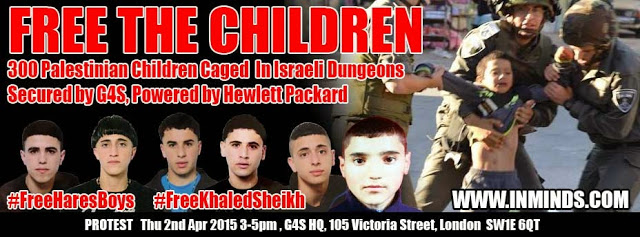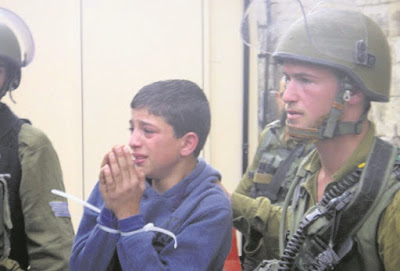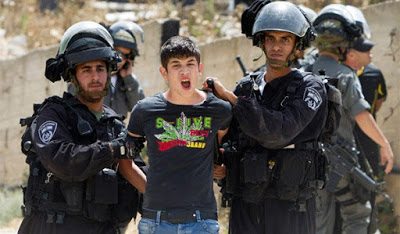I guess there is some sort of perverted logic in arresting the child of the Director of Child Protection & Social Mobilisation at Defence for Children International Palestine. How better to intimidate someone who is politically active than by taking out on their children. Such is the way that the Israeli military thinks.
You
have to rummage through a list of the some of the most repressive and
anti-democratic regimes which arrest children in the middle of the night, beat
them up and imprison them.
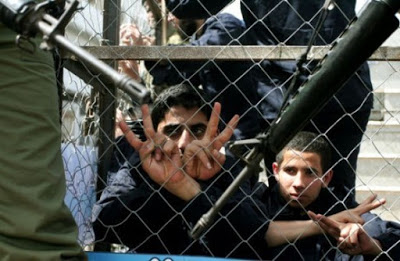 |
| P Palestinian child prisoners in Givon prison |
Riad Arar was
imprisoned in a military prison and shackled, without the benefit of a
lawyer or any other witness when being interrogated. If he was a Jewish child, living in a
settlement adjacent to Hebron, then he would have been afforded all the protections
that the Israel gives to Jewish children.
But that is in the nature of an apartheid society.
imprisoned in a military prison and shackled, without the benefit of a
lawyer or any other witness when being interrogated. If he was a Jewish child, living in a
settlement adjacent to Hebron, then he would have been afforded all the protections
that the Israel gives to Jewish children.
But that is in the nature of an apartheid society.
We
have been asked to send Riad Arar an age appropriate card, which costs £1.33 to
send. Please do so and let Riad Arar know he is not alone and also let the Israeli
military know that he is not forgotten.
Perhaps we can embarrass these bastards into releasing him.
have been asked to send Riad Arar an age appropriate card, which costs £1.33 to
send. Please do so and let Riad Arar know he is not alone and also let the Israeli
military know that he is not forgotten.
Perhaps we can embarrass these bastards into releasing him.
Please
share this post
share this post
Tony
Greenstein
Greenstein
Please join our protest against the abuse of children
in Israeli prisons
in Israeli prisons
Below
is a message from the Palestine UK Social Work network about the detention of
the son of a Palestinian social work colleague. The action requested is
simple and one in which could make such a difference, not only to Amro but to
all other children in Israeli military detention.
is a message from the Palestine UK Social Work network about the detention of
the son of a Palestinian social work colleague. The action requested is
simple and one in which could make such a difference, not only to Amro but to
all other children in Israeli military detention.
Please
buy your card and let Amro know we are thinking about him.
buy your card and let Amro know we are thinking about him.
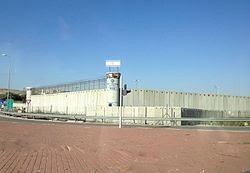 |
| Offer Prison on the West Bank |
February 2016
Dear Colleagues and
Friends,
Friends,
We are writing to ask those
of you who live outside Israel/Palestine to send a card, or a postcard, to Amro
Arar, a 15 year old boy who is currently detained in an Israeli prison in the
Occupied West Bank. The address to send it to is:
of you who live outside Israel/Palestine to send a card, or a postcard, to Amro
Arar, a 15 year old boy who is currently detained in an Israeli prison in the
Occupied West Bank. The address to send it to is:
Amro Arar, Ofer Prison, c/o The Ministry of
Public Security, P.O. Box 18182, Jerusalem 91181 ISRAEL
Public Security, P.O. Box 18182, Jerusalem 91181 ISRAEL
(£1.33 air mail postage from the UK)
We are requesting that the card you send is age
appropriate and without political messages, letting him know that we are aware
of what has happened to him and that we are thinking of him; that he’s not
forgotten.
appropriate and without political messages, letting him know that we are aware
of what has happened to him and that we are thinking of him; that he’s not
forgotten.
In this way, we want to show the Israeli
authorities that we know not just about Amro, but all the other children
incarcerated under Israel’s oppressive system of military law; that Amro and
the others in his terrible situation have friends who know what is happening.
Below we explain why we want you to do this.
authorities that we know not just about Amro, but all the other children
incarcerated under Israel’s oppressive system of military law; that Amro and
the others in his terrible situation have friends who know what is happening.
Below we explain why we want you to do this.
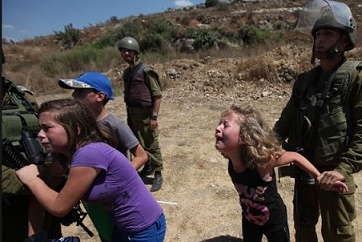 |
| The most moral occupation the world has ever known |
Amro’s father, Riad Arar, is a colleague,
trained in social work, psychology and counselling supervision. He is Director
of Child Protection & Social Mobilisation at Defence for Children International
Palestine, supporting young people faced with the impact of the Israeli
Occupation. At the recent conference on Trauma and Resilience, at Kingston
University, Riad delivered a paper on his work engaging children as researchers
in their own experiences under Occupation, moving them “from passive victims to
agents of change”.
trained in social work, psychology and counselling supervision. He is Director
of Child Protection & Social Mobilisation at Defence for Children International
Palestine, supporting young people faced with the impact of the Israeli
Occupation. At the recent conference on Trauma and Resilience, at Kingston
University, Riad delivered a paper on his work engaging children as researchers
in their own experiences under Occupation, moving them “from passive victims to
agents of change”.
On 5th January 2016 Riad emailed to inform us
that Israeli soldiers had launched a night-time raid on his home in the
beleaguered city of Hebron. They took the 15 year old Amro away with them. Amro
was initially held in an illegal settlement near Bethlehem, Ghosh Iteyoun, and
then moved to Ofer Prison.
that Israeli soldiers had launched a night-time raid on his home in the
beleaguered city of Hebron. They took the 15 year old Amro away with them. Amro
was initially held in an illegal settlement near Bethlehem, Ghosh Iteyoun, and
then moved to Ofer Prison.
Riad went to the military court at Ofer on
Sunday 10th January. Amro told his father that the Israeli soldiers had “bitten
him in his nose and threaten him through the investigation to force him to
convince (confess) and they told him if you are not convene (confess) we are
planning to arrest you and your father and your brothers”. The
soldiers also threatened to spread the rumour that he was a collaborator. Under
this physical and emotional abuse, and in order to protect his family, Amro
‘confessed’ to throwing two stones. Amro is still in prison, waiting for a
court hearing that has been postponed until 8th February.
Sunday 10th January. Amro told his father that the Israeli soldiers had “bitten
him in his nose and threaten him through the investigation to force him to
convince (confess) and they told him if you are not convene (confess) we are
planning to arrest you and your father and your brothers”. The
soldiers also threatened to spread the rumour that he was a collaborator. Under
this physical and emotional abuse, and in order to protect his family, Amro
‘confessed’ to throwing two stones. Amro is still in prison, waiting for a
court hearing that has been postponed until 8th February.
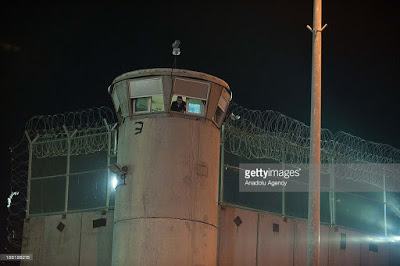 |
| Guard in Watchtower Offer Prison |
Riad described the scene when Amro was remanded
in custody, in the military court at Ofer: “I saw him in the cage with
other 4 children … (he seems too young and small a child) when he saw me in
the beginning he smiled but when I tried to leave after 5 minutes, his tears so
hard and hot”.
in custody, in the military court at Ofer: “I saw him in the cage with
other 4 children … (he seems too young and small a child) when he saw me in
the beginning he smiled but when I tried to leave after 5 minutes, his tears so
hard and hot”.
Amro’s experience is not unique, far from it.
Each year around 700 children face similar treatment. Recently, a secretly
filmed video showed the IDF’s brutal ‘interviewing’ of a 13 year old boy, Ahmed
Manasra. There have been other documentaries exposing the abuse of youngsters
by these military courts, such as the Australian film Stone Cold Justice (https://vimeo.com/86575949),
and the film ‘The Law in These Parts’. Many reports have been published, some
listed below this letter. Jewish Israeli children, even those living in the
same city, are processed under a completely different legal system, one which –
like ours – extends protections to avoid the abuse of minors (see below).
Each year around 700 children face similar treatment. Recently, a secretly
filmed video showed the IDF’s brutal ‘interviewing’ of a 13 year old boy, Ahmed
Manasra. There have been other documentaries exposing the abuse of youngsters
by these military courts, such as the Australian film Stone Cold Justice (https://vimeo.com/86575949),
and the film ‘The Law in These Parts’. Many reports have been published, some
listed below this letter. Jewish Israeli children, even those living in the
same city, are processed under a completely different legal system, one which –
like ours – extends protections to avoid the abuse of minors (see below).
But while the world turns a blind eye, there is
no pressure on Israel to end this shameful situation.
no pressure on Israel to end this shameful situation.
So, could you please send a card to let Amro
know he’s not forgotten, but also to show his captors that Amro and the others
in his terrible situation have friends who know what they are doing.
know he’s not forgotten, but also to show his captors that Amro and the others
in his terrible situation have friends who know what they are doing.
The point of our action is to bring attention,
citing Amro’s example, to the assaults on and abuse of children taking place in
a planned and systematic way in the Occupied Territories (see further
information below).
citing Amro’s example, to the assaults on and abuse of children taking place in
a planned and systematic way in the Occupied Territories (see further
information below).
Best wishes,
Teresa Bailey, Chris van Duuren, Martin Kemp,
Eliana Pinto, Cathy Troupp, Adrian Worrall
Eliana Pinto, Cathy Troupp, Adrian Worrall
• At the end of October, 2015, 307 Palestinian
children were imprisoned in the Israeli military detention system, an increase
of 79.5% from September, according to Israel Prison Service (IPS) data. (1)
children were imprisoned in the Israeli military detention system, an increase
of 79.5% from September, according to Israel Prison Service (IPS) data. (1)
This is the largest number of Palestinian child
detainees in Israeli military detention since April 2010. Nearly 60% were held
in prisons inside Israel in violation of Article 76 of the Fourth Geneva
Convention, which prohibits the transfer of prisoners from occupied territory
into the territory of an occupying power.
detainees in Israeli military detention since April 2010. Nearly 60% were held
in prisons inside Israel in violation of Article 76 of the Fourth Geneva
Convention, which prohibits the transfer of prisoners from occupied territory
into the territory of an occupying power.
• Palestinian children are subject to the
Israeli military courts, while Jewish Israeli children living in the same city
are subject to the civilian legal system. To illustrate the difference: The
maximum period of detention before being brought before a judge for a
Palestinian child is 8 days; for an Israeli child, it is 12-24 hours. The
maximum period of detention without access to a lawyer for a Palestinian child
is 90 days; for an Israeli child, it is 48 hours. (2) The maximum period of
detention without charge for a Palestinian child is 188 days; for an Israeli
child it is 40 days. (3) The maximum period of detention between being charged
and conclusion of trial for a Palestinian child is 2 years; for an Israeli
child it is 6 months.
Israeli military courts, while Jewish Israeli children living in the same city
are subject to the civilian legal system. To illustrate the difference: The
maximum period of detention before being brought before a judge for a
Palestinian child is 8 days; for an Israeli child, it is 12-24 hours. The
maximum period of detention without access to a lawyer for a Palestinian child
is 90 days; for an Israeli child, it is 48 hours. (2) The maximum period of
detention without charge for a Palestinian child is 188 days; for an Israeli
child it is 40 days. (3) The maximum period of detention between being charged
and conclusion of trial for a Palestinian child is 2 years; for an Israeli
child it is 6 months.
On November 3, 2015, the Knesset passed a series
of amendments to the Israeli penal code and youth law. They imposed 10-year
prison sentences for throwing stones or other objects at moving vehicles with
the possibility of endangering passengers or causing damage. Those convicted of
throwing stones with the purpose of harming others would receive double the
sentence. The latest bill, approved by the Israeli Ministerial Committee for
Legislation, proposes custodial sentences for children, as young as 12,
convicted of “nationalistic-motivated” violent offences under Israel’s civilian
legal system. The actual serving of sentences would be deferred until the child
reaches the age of 14. (1.)
of amendments to the Israeli penal code and youth law. They imposed 10-year
prison sentences for throwing stones or other objects at moving vehicles with
the possibility of endangering passengers or causing damage. Those convicted of
throwing stones with the purpose of harming others would receive double the
sentence. The latest bill, approved by the Israeli Ministerial Committee for
Legislation, proposes custodial sentences for children, as young as 12,
convicted of “nationalistic-motivated” violent offences under Israel’s civilian
legal system. The actual serving of sentences would be deferred until the child
reaches the age of 14. (1.)
References
1.December 16th 2015:
Defence for Children, International, Palestine, “Child prisoners swell in
numbers amid reports of poor jail conditions”.
Defence for Children, International, Palestine, “Child prisoners swell in
numbers amid reports of poor jail conditions”.
2. For security offences
the maximum period is 21 days.
the maximum period is 21 days.
3. To continue detention
over 30 days before charge requires the approval of the Attorney
over 30 days before charge requires the approval of the Attorney
See
also
also
Posted in Blog
